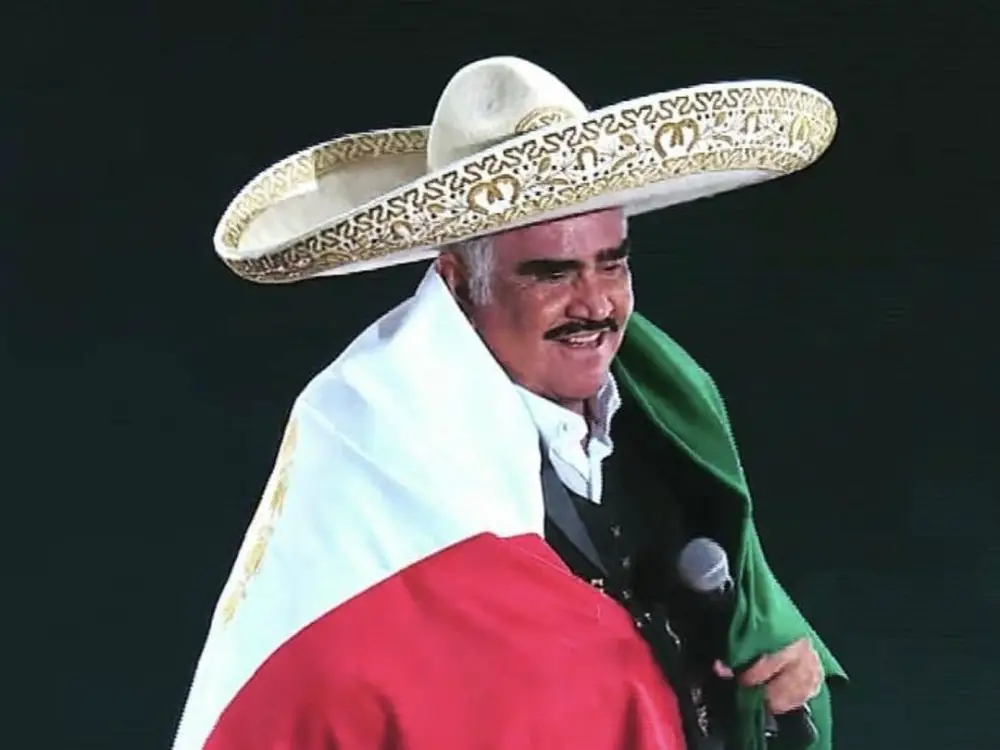For some, waking up on a Saturday morning to “Acá Entre Nos” or “A Mi Manera” isn’t foreign — not in a Hispanic household, that is. From quinceñeras, baby showers and weddings to even just cleaning, life in the Hispanic world has been filled with the music of Vicente Fernández, an artist beloved by many.
On Dec. 12, headlines like “The Last King of Mariachi Dies” and “The Ending of a 50-Year Legacy” revealed news of Fernández’s passing.
Vicente Fernández Gómez, commonly known as “Chente,” “El Charro de Huentitán,” “El Ídolo de México” and “El Rey de la Música Ranchera,” became a cultural icon around the 1970s. Known for his music, acting and film production, Fernández died from pneumonia in Guadalajara, Mexico.
Fernández had been under medical care since August of 2021, when the singer was admitted to the hospital due to a serious fall that led to spinal cord trauma, necessitating surgery. Fernández was released, but a month later, returned to the hospital after contracting the pneumonia that would lead to his death.
As news of Fernández’s passing spread, the Hispanic community mourned in a variety of ways. Facebook and Instagram were each flooded with stories and posts dedicated to Fernández, thanking him for his years of music. Likewise, the hashtag #VicenteFernandez trended on Twitter as fans tweeted “descanse en paz” in the hopes that their idol would rest in peace.
Fernández was born on Feb. 17, 1940, in Huentitán El Alto, Jalisco, Mexico, to Ramón Fernández and Paula Gómez de Fernández. At the age of 14, Fernández started singing in restaurants and weddings, but he didn’t receive his first payment for his talents until the age of 21 for a show called “La Calandria Musical.” It wasn’t until ranchera singer Javier Solís’ passing in 1966 that Fernández first received a recording contract. Fernández signed with CBS Mexico, now called Sony Music, and released numerous hit songs.
Fernández was not only known for his singing but for his acting as well. He debuted in his first film in 1971 and later starred in his first film in 1976; he went on to headline a total of 30 films. Fernández introduced his music in many of his movies and even titled some of the films the same names as his songs.
Fernández is not the only singer in his family; his son Alejandro Fernández became a popular Latin music singer as well. Nicknamed “El Potrillo,” Alejandro became famous in the 1990s when he signed with Sony Music. As Vicente Fernández’s body was transferred to Arena VFG where his fans and family had been waiting to say goodbye, Alejandro paid homage to his family with a heartfelt performance. After Vicente’s mariachi band sang all of the late singer’s hits — including “El Rey,” which feature the lyrics, “But the day I die, I know you’ll cry; cry and cry” — Alejandro performed an emotional “Amor de los Dos” to his mother, Doña Cuquita.
Alejandro posted a photo of him and his father on Instagram the day of his passing with a moving caption that said, “The lights in the sky have never shined so bright. Without a doubt, I couldn’t have asked for a better father, friend and teacher. Thank you for showing me the way. Although we’ll miss you every day, your spirit and voice will live forever in your family, your pueblo and your fans. Love you, pa.”
A vigil was held on Dec. 13 for Fernández at his star on the Hollywood Walk of Fame. However, the vigil was interrupted by a nearby shooting, though it was later reported that the shooting had nothing to do with the singer.
This echoed an event that took place nearly 25 years prior. In 1998, just days after Fernández received his star on the Hollywood Walk of Fame, his first son, Vicente Fernández Jr., was kidnapped, and a ransom was demanded. At the time, Fernández didn’t go to the police; Fernández and Alejandro continued to perform as a way to keep up public appearances. The star paid $3.2 million in ransom to have his son released back to him. When returned after almost a month, his son had two fingers cut off and was left outside of the ranch they lived on.
Since Fernández’s passing, many big names have bid farewell. Hillary Clinton tweeted, “A musical icon and a good man. Sending my condolences to his loved ones.” President Joe Biden also posted the following message on his Twitter account: “The music world has lost an icon. The music of Vicente Fernández created memories for millions. We send our condolences to his family and all those who loved him. Vicente will be remembered for generations to come.”
Clinton and President Biden aren’t the only political figures who were saddened by the singer’s passing; President of Mexico Andrés Manuel López Obrador tweeted, “I convey my condolences to family, friends and millions of admirers of Vicente Fernández, a symbol of the ranchera song of our time, known and recognized in Mexico and abroad.” President Obrador’s tweet was joined by one from the president of Colombia: “The art and music of Latin America are in mourning. Vicente Fernández was a true genius of folklore and the music of our region. His departure hurts us and his legacy will live forever. Our solidarity is with our brothers in Mexico and with all their loved ones.”
A number of music legends also expressed their sadness online. Beyoncé, who never had the chance to work with Fernández but has worked with Alejandro, paid tribute to him on her website, where she posted a famous photo of the singer and the words “Rest in Peace.” Alongside Beyoncé, George Strait, known as the King of Country, has mentioned many times that Fernández is one of his idols, and has even performed “El Rey” completely in Spanish.
Sad news today. We lost The amazing legendary Vicente Fernández this morning. One of my heroes. May he Rest In Peace and may God bless and comfort his family. Hasta la Cruz Chente!! gs
— George Strait (@GeorgeStrait) December 12, 2021
Fernández died on the day of Our Lady of Guadalupe, to whom he was greatly devoted. Ending the night of his death, Mariachi Azteca performed “Volver, Volver,” a song that has now been covered by almost two dozen different singers. The song is about lost love, but the word “volver,” interestingly enough, means “go back” or “return” in Spanish.
















